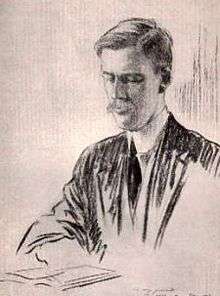Charles Wharton Stork
Charles Wharton Stork (12 February 1881 – 22 May 1971) was an American literary author, poet, and translator.[1]

Life
Charles Wharton Stork was born in Philadelphia on 12 February 1881 to Theophilus Baker and Hannah (Wharton) Stork. He graduated from Haverford College and Harvard University and taught in the Department of English at the University of Pennsylvania. He died in Philadelphia on 22 May 1971.[1]
On 5 August 1908 he married Elisabeth von Pausinger, daughter of Franz Xaver von Pausinger, artist, of Salzburg, Austria. They had a daughter, Rosalie (Stork) Regen, and three sons, Francis Wharton, George Frederick, and Carl Alexander. In 1939, Stork was a survivor of the sinking of the SS Athenia in the Atlantic Ocean.
He wrote poems such as Beauty's Burden,[2] Death - Divination and The Silent Folk.[3] He translated the hymn "We Worship Thee, Almighty Lord" by Johan Olof Wallin,[4] and some of the songs of Carl Michael Bellman.[5] He is known to have disliked modernist literature.[6]
His translations of the Swedish poet Gustaf Fröding were harshly criticized in reviews by Svea Bernhard[7] and Ernst W. Olson[8] but generally praised in an article by Axel J. Uppvall,[9] who along with Olson had also rendered Fröding's poems into English.[10][11]
Stork and his British contemporary, C. D. Locock, published several volumes of Swedish poetry in translation.[12] Among the authors they covered were Gustaf Fröding, Erik Axel Karlfeldt, Birger Sjöberg and August Strindberg.[13][14]
Works
- Day Dreams of Greece, 1909
- The Queen of Orplede, 1910
- Sea and Bay: A Poem of New England, 1916[15]
- Alcibiades, 1967
Translations
- The Master of Palmyra, dramatic poem, 1914
- Gustaf Fröding: Selected Poems Translated from the Swedish, (New York: Macmillan, 1916)
- Anthology of Swedish Lyrics, 1750-1915 (New York: The American-Scandinavian Foundation, 1917) (including some of Bellman's Epistles and Songs)
- The Lyrical Poems of Hugo Von Hofmannsthal, 1918
- Sweden’s Laureate: Selected Poems of Verner Von Heidenstam, 1919
- The Charles Men, Pts. 1-2, historical fiction, 1920
- Modern Swedish masterpieces, short stories, 1923
- The Dragon and the Foreign Devils, non-fiction, 1928
- Martin Birck’s Youth, novel, 1930
- Short Stories of Hjalmar Söderberg, 1935
- Arcadia Borealis, poems of Erik Axel Karlfeldt, 1938
- The Tales of Ensign Stål, poems of J. L. Runeberg, 1938
- Anthology of Norwegian Lyrics, 1942
- A Second Book of Danish Verse, 1947[13]
References
- "Charles Wharton Stork 1881-1971". Hymntime. Archived from the original on 14 September 2015. Retrieved 9 March 2016.
- "Beauty's Burden". Bartleby. Retrieved 9 March 2016.
- "Charles Wharton Stork Poems". PoemHunter. Retrieved 9 March 2016.
- "Augustana Choir Discography". Augustana College, Illinois. Archived from the original on 1 April 2016. Retrieved 9 March 2016.
- Stork, Charles Wharton. Anthology of Swedish lyrics from 1750 to 1915. New York: The American-Scandinavian Foundation, 1917.
- Filreis, Alan (2012). Counter-revolution of the Word: The Conservative Attack on Modern Poetry, 1945-1960. UNC Press Books. pp. 210–211. ISBN 978-1-4696-0663-7.
- Bernhard, Svea (April 1918). "Review: Fröding, Classic and Futurist. Reviewed Work: Gustaf Fröding—Selected Poems by Charles Wharton Stork, Gustaf Fröding". Poetry. 12 (1): 52–54. JSTOR 20571647.
- Olson, Ernst W. (July 1916). "Review. GUSTAF FRODING: SELECTED POEMS". Publications of the Society for the Advancement of Scandinavian Study. 3 (2): 217–219. JSTOR 40914981.
- Uppvall, Axel J. (July 1916). "Review: Fröding in English. Reviewed Work: Gustaf Fröding—Selected Poems by Charles Wharton Stork, Gustaf Fröding". The Poetry Journal. 6 (1): 27–34.
- Schön, Anders, ed. (1902). Prärieblomman. Lutheran Augustana Book Concern. pp. 240–241.
- The Poetry Journal, (February 1916), pp. 1-6
- Songs and poems from Sweden archive.org. Retrieved: May 23, 2016.
- The National Cyclopedia Of American Biography, (James T. White & Company: Clifton, New Jersey, 1975), Volume 56, pp. 141-142.
- Who Was Who In Literature, 1906-1934, (Detroit: Gale Research Co., 1979) Volume 2, p. 686
- The Book News Monthly, (September 1915 – August 1916), p. 421